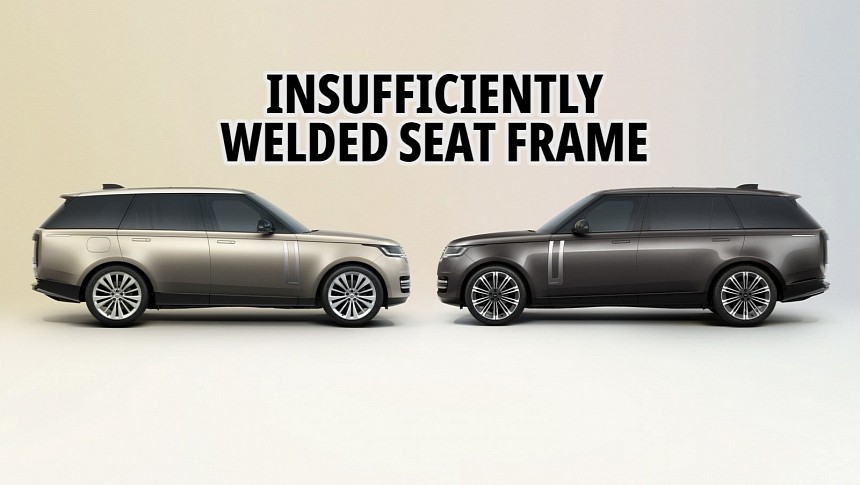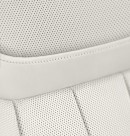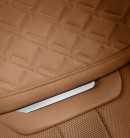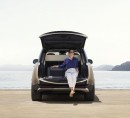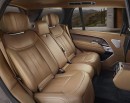Internally referred to as L460, the fifth-gen Range Rover was recently called back to remedy an engine issue stemming from Bavarian automaker BMW. The Brits followed up on that campaign with another recall in regard to the second-row seat of the full-size luxobarge, with the defect attributed solely to supplier Brose UK.
Back in September 2022, during production verification durability testing, Jaguar Land Rover identified a failure on a weld of the 60-percent seat latch of the 60/40 split-folding rear seat frame of a seven-seat Range Rover. The Supplier Technical Assistance Team immediately sprung into action to define the scope of this problem.
In the event of a crash or even sudden braking, the seat will move forward and upward, therefore increasing the risk of injury to both second- and first-row occupants. For some reason or another, Jaguar Land Rover does not explain how the aforementioned supplier effed it up this badly. The report attached below does not detail how Brose UK corrected this problem in production either.
In any case, Jaguar Land Rover's North American division estimates that 500 vehicles may feature the suspect second-row seat, whose base frame bears part number M8E2-613A11-BL. Only seven-seat vehicles are called back, namely 2022 and 2023 model year Range Rover vehicles manufactured at the Solihull plant in the period between February 2022 and June 2022.
Dealers will be instructed on April 20 to inspect the rear seat base latch, and – if anything seems off – replace the 60 percent's frame and associated componentry for extra peace of mind. Owner notifications will be mailed no later than June 2 as per JLR's report to the NHTSA.
Twinned with the L461 Range Rover Sport, the L460 Range Rover is underpinned by the MLA-Flex platform. This vehicle architecture uses a mix of metals to improve the body's stiffness by up to 50 percent. Noise transmission has also been reduced, but the main takeaway is that Jaguar Land Rover designed the MLA-Flex platform with an emphasis on electrification.
Currently available with a pure internal combustion engine supplied by BMW, as well as mild-hybrid and plug-in hybrid sixers, the Range Rover has been confirmed to welcome an all-electric variant in 2024. Of course, the Range Rover Sport EV will follow suit.
Sitting at the very top of the Land Rover lineup, the Range Rover is understandably expensive. For the standard wheelbase with the P400 mild-hybrid powertrain and all-wheel drive, you're looking at $106,500 sans destination charge in the United States. The P440e plug-in hybrid kicks off at $110,500 at press time, whereas the most affordable V8-powered Range Rover comes in the guise of the P530 at $129,000.
P as in petrol (thanks, British English!) and 530 for metric ponies. The N63 twin-turbo V8 of BMW origin cranks out 523 horsepower and 553 pound-feet (750 Nm), enabling the luxury-oriented sport utility vehicle to reach 60 mph (97 kph) in merely 4.4 seconds.
In the event of a crash or even sudden braking, the seat will move forward and upward, therefore increasing the risk of injury to both second- and first-row occupants. For some reason or another, Jaguar Land Rover does not explain how the aforementioned supplier effed it up this badly. The report attached below does not detail how Brose UK corrected this problem in production either.
In any case, Jaguar Land Rover's North American division estimates that 500 vehicles may feature the suspect second-row seat, whose base frame bears part number M8E2-613A11-BL. Only seven-seat vehicles are called back, namely 2022 and 2023 model year Range Rover vehicles manufactured at the Solihull plant in the period between February 2022 and June 2022.
Dealers will be instructed on April 20 to inspect the rear seat base latch, and – if anything seems off – replace the 60 percent's frame and associated componentry for extra peace of mind. Owner notifications will be mailed no later than June 2 as per JLR's report to the NHTSA.
Twinned with the L461 Range Rover Sport, the L460 Range Rover is underpinned by the MLA-Flex platform. This vehicle architecture uses a mix of metals to improve the body's stiffness by up to 50 percent. Noise transmission has also been reduced, but the main takeaway is that Jaguar Land Rover designed the MLA-Flex platform with an emphasis on electrification.
Currently available with a pure internal combustion engine supplied by BMW, as well as mild-hybrid and plug-in hybrid sixers, the Range Rover has been confirmed to welcome an all-electric variant in 2024. Of course, the Range Rover Sport EV will follow suit.
Sitting at the very top of the Land Rover lineup, the Range Rover is understandably expensive. For the standard wheelbase with the P400 mild-hybrid powertrain and all-wheel drive, you're looking at $106,500 sans destination charge in the United States. The P440e plug-in hybrid kicks off at $110,500 at press time, whereas the most affordable V8-powered Range Rover comes in the guise of the P530 at $129,000.
P as in petrol (thanks, British English!) and 530 for metric ponies. The N63 twin-turbo V8 of BMW origin cranks out 523 horsepower and 553 pound-feet (750 Nm), enabling the luxury-oriented sport utility vehicle to reach 60 mph (97 kph) in merely 4.4 seconds.
